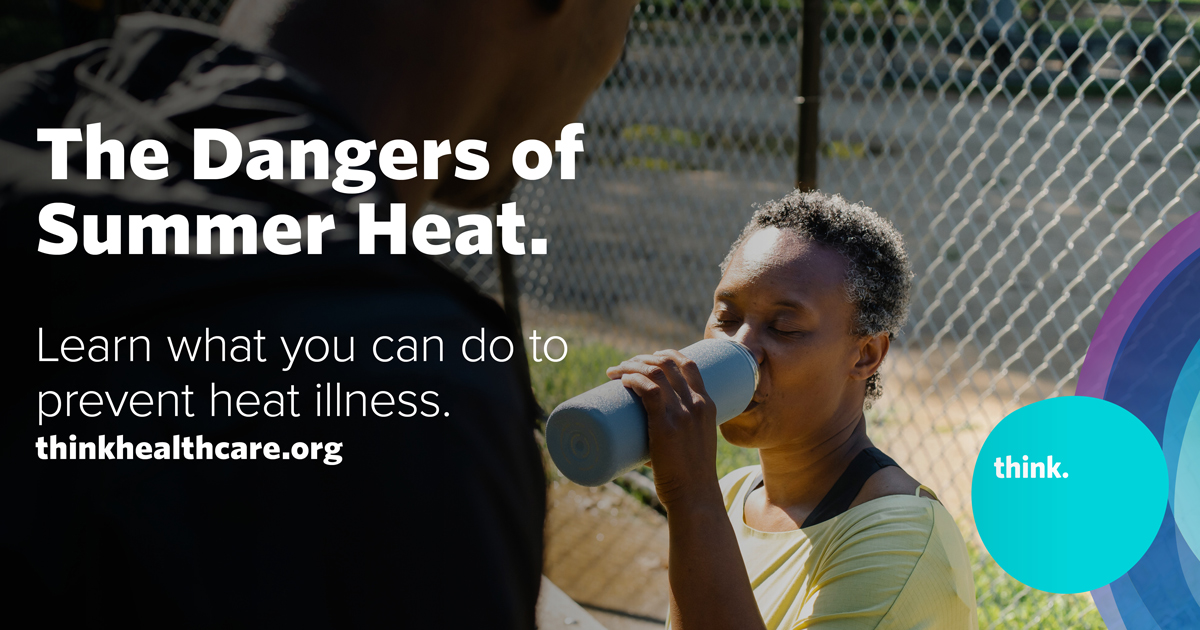When the summertime mercury soars, the number of heat-related illnesses soar too. The Centers for Disease Control and Prevention (CDC) reports that in the United States, heat-related deaths are among the greatest causes of weather-related fatalities. An average of 658 people in the country die from extreme heat each year.
Heat is not the only concern. High humidity can also lead to heat-related illnesses, also called hyperthermia. A combination of soaring temperatures and humidity is double trouble. Heat stroke and heat exhaustion are two of the most serious conditions related to excessive heat.
How to Recognize Heat Illness Symptoms
Heat exhaustion occurs when an overheated person loses excessive water and salt, typically through acute sweating.
Heat exhaustion symptoms include:
- Headache
- Nausea or vomiting
- Dizziness or fainting
- Muscle cramping
- Weakness or fatigue
- Intense sweating
- Increased body temperature
- Thirst
- Irritability
- Lowered urine output
Heat stroke occurs when the body fails to control its own temperature that is rising rapidly. Instead of cooling down naturally through sweating, the body’s sweating mechanism shuts down. With heat stroke, a person’s body temperature can reach 106°F or more within 15 minutes. Without emergency heat stroke treatment, a person can face permanent brain or organ disability or death.
Heat stroke symptoms include:
- Hot, red, dry skin (no sweating)
- High body temperature (greater than 103° (39.4°C)
- Rapid pulse
- Confusion, changed mental state
- Slurred speech
- Loss of consciousness
- Seizures
What to Do if Someone Falls Ill in the Heat
For the person with suspected heat stroke, take these first aid steps:
- Immediately call 911 for emergency medical care.
- Move the person to a cooler, shaded area and remove outer clothing.
- Keep air circulating around the overheated individual.
- Cool the person down by:
- Apply cold water or an ice bath
- Wet the skin
- Place wet cloths on the skin, especially head, neck, armpits and groin
- Soak clothes in cool water
For suspected heat exhaustion, take these first aid steps:
- Transport the person to the ThinkQuick Walk-In Clinic or an emergency room.
- Call 911 for emergency medical care if transport is not possible.
- Move the person to a cooler, shaded area.
- Remove extra clothing, socks and shoes.
- Help the person frequently sip cool water.
- Apply cold compresses to skin, especially face, head and neck.
- Or direct the individual to cool their face, head and neck with cold water.
Who Is at Greatest Risk?
Young children and adults age 65 and older are particularly vulnerable to excessive heat. Those individuals with high blood pressure, diabetes, heart disease or obesity are also at high risk for heat exhaustion. Participating in active physical activities in hot weather, drinking alcohol or taking medications that interfere with the body’s temperature or perspiration regulation can also bring on heat-related illness.
What You Can Do to Prevent Heat Illnesses
Know if you or a loved one is at risk for heat-related illnesses. Are there any underlying health conditions that can be exasperated in higher heat and humidity? If a home is not air-conditioned in hot weather, be sure occupants can cool down with other cooling appliances such as a swamp cooler or fans. Or encourage those without air conditioning during heat spells to spend time in cooler public facilities.
In warmer weather, never leave children or pets alone in cars even just to run a quick errand.
Other proactive ways to stay cool is to wear lightweight, loose-fitting clothing and a sun hat and only exercise, run errands or participate in outdoor activities during the cooler parts of the day. Drinking plenty of nonalcoholic liquids and leaving extra fresh water for pets will also help prevent overexposure to heat. Be sure to check on disabled, elderly or home-bound people during heat waves.
We Are Here to Help
Every day of the week, the ThinkQuick Walk-In Clinic treats minor illnesses to acute injuries including reactions to overheating in the sun. Learn more about underlying health conditions that can lead to heat-related illness in hot temperatures. Think Whole Person Healthcare is devoted to treating the whole person while delivering the highest quality at the lowest cost possible. Call 402-506-9049 to book an appointment today or schedule an appointment online with your primary care physician. Think Whole Person Healthcare can provide same-day appointments conveniently located in central Omaha.
